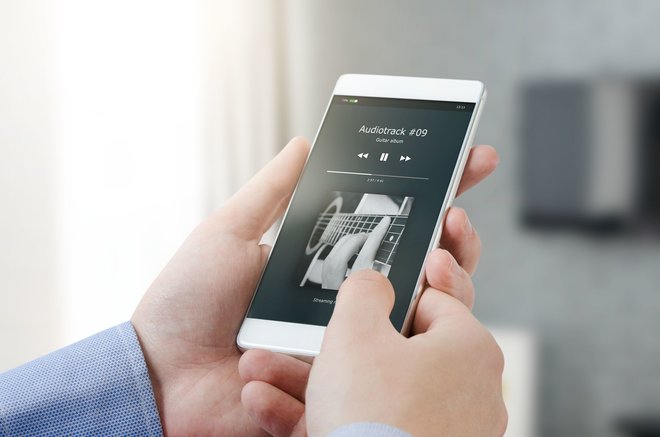In 2014, the music industry experienced an unprecedented crisi I. World-wide music sales plummeted to 14 billion dollars, 11 billion less than in 1999. In the past, the biggest threats to music sales were bootlegs and radio recordings. Today, it's the internet. There used to be a time when users could simply search for "top 100 charts download" online and find a dozen sites with downloadable songs. But with €10 music flat rates and giant song collections, music streaming has slowly taken over the market. So can it save the industry, as many believe?

Zoë Keating was furious. Being a cellist, the US-based musician had enjoyed remarkable success, with her songs being available through various streaming portals. But her 2017 profits infuriated her so much that she published them online, spilling a secret that had, until then, been closely guarded by streaming providers: royalty per stream. In her case: $19,625 after 4 million streams, before taxes, naturally. Spotify pays 0.38 cents, Amazon Music 0.37 cents and Amazon Prime even 6 cents per stream, though there are rumors they use music streaming only to flesh out their customer profiles. YouTube pays a measly 0.07 cents per stream, so, if you were an artist, half the world's population would have to listen to your music on YouTube before you could order that new sports car. Remarkably, Keating still earned the lion's share of her profits through Spotify, thanks to a huge number of listeners!
For smaller bands, streaming services can be a money-losing business because of account setup and maintenance fees. Reason enough for many underground bands to abstain and turn to smaller portals, like Bandcamp, or free services, like YouTube, instead. And bands without record deals make even less: 0.04 cents on Spotify, provided the band owns all the rights to their work, a rare occurrence these days. It usually goes like this: a producer hires a composer and singers who then sing songs not of their own making, like James Blunt - who earns precisely 0.04499368 pence per stream, or so he wrote in frustration. That means, views in the millions are still barely enough to cover the weekly visit to the pub.
 An adequate CD replacement for many
An adequate CD replacement for many
Of course, the situation is different for mega stars. After all, subscribers pay to hear their favorites, pressuring Spotify and others into offering more lucrative deals to the respective managers. Naturally, negotiations are tough and usually yield far better deals than the breadcrumbs left for the musician next door. And viewer magnets like The Beatles or Taylor Swift also make for effective promos to gain new subscribers. While fans rejoice, the bottom line remains: The big get bigger and the small get smaller. The streaming business simply isn't profitable without star power and smaller artists have to find different sources of income. And they do, as reflected by the increase in live gigs and fan shops overflowing with items of particular bands. CD, vinyl and download sales, that generally yield better profits, are in decline, at least when looked at on a broader scale. Again, the big names draw money while the others are struggling.
So are streaming portals the bad guys? Hardly, they're not exactly swimming in money. Even Spotify haven't seen a single profitable quarter - not for lack of customer growth but because they only keep 21% (around €2.10 out of each €9.99 subscription). The rest goes to record labels and artists. Sounds fair, right? It is - for record companies! They take 73% (€7.29), leaving 6% (€0.60) for artists. The situation is strongly reminiscent of the 60s when stars were paid peanuts despite millions of dollars worth of record sales! Yes, streaming sales now outweigh CD and vinyl sales (in many countries) and the industry seems to be on the right track - but artists are second-class passengers.
 Live concerts as a source of income
Live concerts as a source of income
Even though the music industry still manages to draw large sums of money, creatives and artists only get a minuscule share of the pie. And since I don't expect record companies to suddenly discover their social side, subscription fees would have to be raised to offer better monetary compensation for artists. Currently, instead of saving music, we're saving record companies. But who'd be willing to spend €50 on streaming? It seems, passion will remain the only motivation for most musicians to publish their songs online for the time being.
What I would like to know: Do you feel artists get paid enough for their work? Do you use streaming services or do you prefer the "old-fashioned" way (CD, LP)?




Would not touch it with a bargepole Firefox for me
I paid for Pandora for years, then a change in circumstances led me to drop it. Even then, I preferred CDs (vinyl is not as good as CDs, despite all of the so-called audiophiles who insist otherwise). For many years, I've bought nearly all of my CDs directly from the artists...between that, and paying to hear them live, I think I'm doing as well as I can, as far as trying to get more of the money in their pockets. I could be wrong....
ditto lee
i said this at a tavern "disposable music!"
i buy sociable crackers, cans of beans, hot sauce, rice. I even use Harvard sauce. Nice people at Harvard.
Disposable razors,
disposable pens,
disposable phones,
streaming - disposable music and video.
I think that sums it up. I mean, if the music is disposable, then the creator will be treated as such. I think that when the volume of stream sales has to be so excessive to earn a basic wage, artists may reconsider what they are doing.
@David Penrose,
It looks like many of the music steaming services do have subscriptions if you don't want ads, that's according to this site: https://www.digitaltrends.com/music/best-music-streaming-services/
Your comment, 'Before Adobe adopted this subscription model, there were probably dozens of 'pirate' Photoshop users for every one legitimate paying customer. Now that problem has all but disappeared, and I believe (although I don't know for a fact) Adobe's revenues must have boomed.'
---
Maybe many users ditched Adobe's Rent forever - never own model and went for other options, like Serif's Affinity Photo, or GIMP (completely free). Even for RAW files, there are darktable and Rawtherapee, both completely free.
It would be interesting to see actual stats to back up your sort of claim on pirated copies vs CS subscription sales and trends.
Unfortunately, without references I find it hard to interpret this blog. It implies that record labels take profits from artists, but is that 73% really taken from every sale, or simply the percentage of money the recording industry takes (part of which it gives to its artists) vs. 6% for artists who aren't part of it? If that's the case, then it's not a problem by itself, simply a reflection on people listening a lot more to artists who are signed by record labels vs indies who aren't.
It would indeed be interesting to know what percetange record labels like Spinefarm or Napalm Records take from the artists.
Only 6% of the Spotify subscription fee go to the artist. The record companies take 73% and Spotify 21%. These figures likely reflect the situation on average but there isn't any other more reliable data available on this subject. Personally, I'm guessing some indy labels are more generous towards their artists but companies generally like to keep this information under wraps.
I've been using music streaming services searches Apple music which has a lot of the great stuff that I like to listen to. The subscription price is around 995 per month and well worth it.
Being legally blind and living in a small apartment I don't have the room for a bunch of CDs and especially vinyl so streaming is the best way to go for me.
I also want an internet radio station which plays album Rock so I Do by plenty of MP3s online from places like the iTunes Store Amazon and other places.
A lot of Canadian artists such as Greg Godovitz formerly of the band Goddo because of the fact that not very many United States radio stations play Canadian artists anymore.
To top it all off it is hard to find a good album rock station that plays true album Rock such as this one http:thelegacy.shorturl.com
I see streaming as a very important way to promote genres that are long forgotten since terrestrial radio is lagging behind when it comes to this.
Either way, the record companies are going to come out on top. Even if the artist owns his work out right, he doesn't have the time and money to market and contributes his products - like an Amazon or Spotify. So, in the end, the shares become unequal at this point and will always.
Nothing new the artist and consumers have always been rip off and screwed by the media company's so wonder why so much is pirated and artist feel ripe off
People who originate intellectual property should of course be properly paid for it.
The following paragraph may initially seem like an irrelevance, but bear with me...!
I'm a photography enthusiast and, like very many of my kind, I use Photoshop which is now only available by subscription. Before Adobe adopted this subscription model, there were probably dozens of 'pirate' Photoshop users for every one legitimate paying customer. Now that problem has all but disappeared, and I believe (although I don't know for a fact) Adobe's revenues must have boomed.
If the entire music supply industry adopted a subscription model, I wonder whether this would resolve their income problems. Of course it wouldn't be popular with music consumers, but if it were the only way for them to obtain their music what are they going to do? Go without? I don't think so.
Whatever is on the radio is what I listen to. I have yet to pay for streaming music, and I doubt that I ever will. And, since I have no favorites, I like all types of music equally well, I can listen to any radio station that isn't playing a commercial.